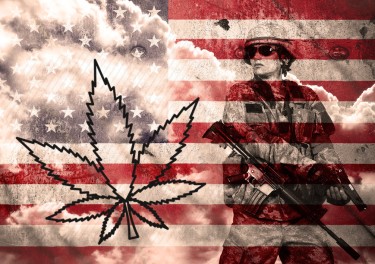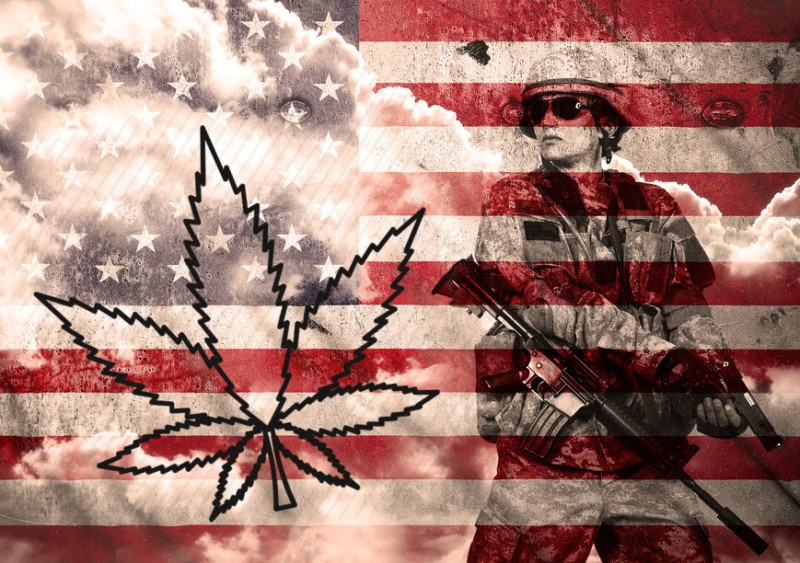
Cannabis and War – Is the US preparing for War?
https://www.marijuanamoment.net/u-s-house-votes-to-ban-military
-from-testing-recruits-for-marijuana-as-a-condition-of-enrollment/
In times of national urgency, the United States has historically made swift policy changes to bolster its military capabilities. During World War II, the government briefly re-legalized hemp cultivation to support the war effort, with even future president George H.W. Bush reportedly parachuting using hemp-derived materials. This pragmatic approach was quickly reversed post-war.
Today, we're witnessing a series of legislative moves that echo this pattern of military preparedness. The House of Representatives has recently passed two significant measures: one removing marijuana testing as a requirement for military recruits, and another automatically registering men aged 18 to 26 for selective service. These changes come alongside a substantial increase in military spending and the largest military pay raise in history.
These developments occur against a backdrop of global tensions, including ongoing conflicts in Ukraine and Gaza, U.S. troops positioned near Russian borders, and reports of Russian supersonic missiles in Cuba. While it's crucial to avoid jumping to conclusions, these legislative and military moves naturally raise questions about the nation's strategic positioning.
Are we witnessing preparations for a potential large-scale conflict, or are these simply modernization efforts for a changing world? As we delve into these recent policy shifts, we'll explore their implications and the broader context of U.S. military readiness in an increasingly complex global landscape.
Wars and Rumors of Wars
It's evident that global peace remains elusive. Despite most people's desire for tranquility, large-scale conflicts continue to erupt worldwide. Recent geopolitical shifts have raised concerns about potential escalations.
A significant development is Saudi Arabia's decision to end its exclusive use of the petrodollar, opening up to other forms of payment for oil transactions. This move could potentially weaken the US dollar's global dominance, albeit gradually. Such a shift might signal a decline in US economic supremacy on the world stage.
In response to these economic challenges, there are indications that the US military-industrial complex, along with major defense contractors like Boeing, Raytheon, and investment firms such as BlackRock, may be intensifying their operations. Historically, the US economy has been closely tied to military endeavors, with the nation engaged in conflicts or ideological battles for much of its existence.
During wartime, these mega-industries typically see increased cash flow. There's a historical pattern of incentivizing conflict, with allegations of intelligence agencies like the CIA infiltrating "enemy states" to create instability and facilitate regime change.
Given the nature of the military-industrial complex, economic motivations, and changing international policies, some observers argue we could be approaching a critical juncture. However, a significant challenge to traditional war efforts is the current low level of patriotic sentiment, with many citizens reluctant to participate in what some view as a "rich man's war," echoing themes from Creedence Clearwater Revival's protest songs.
The recent legislative changes removing barriers to military recruitment and implementing automatic enlistment for certain age groups have led some to speculate about preparations for potential conflict. While these moves don't definitively prove war plans, they do raise questions about the nation's military readiness and strategic intentions.
Cannabis and the Military
Let's examine the evolving relationship between cannabis and the U.S. military. Recent legislative changes suggest a significant shift in policy that could have far-reaching implications.
According to the House-approved National Defense Authorization Act (NDAA), the Department of Defense is required to report on the number of service members discharged due to marijuana use over the past ten years. While exact figures are pending, this requirement acknowledges the impact of cannabis-related discharges on military personnel.
Currently, 38 states have implemented some form of cannabis program, reflecting a growing acceptance of cannabis use nationwide. Recent surveys indicate that approximately 49.6 million Americans (or 18% of the population) use cannabis, with usage rates higher among males of military age.
Veterans have long advocated for cannabis as a treatment for PTSD, though progress in this area has been slow. The recent policy shift could potentially pave the way for the VA to offer cannabis as a PTSD treatment option, addressing a long-standing demand from the veteran community.
However, the timing and broader context of this policy change raise questions. While it could be seen as a progressive step aligning military policy with changing societal norms, some speculate about underlying motivations. The removal of cannabis testing as a barrier to enlistment, coupled with other recent military-related legislative changes, has led some to question whether this is part of a larger strategy to broaden the pool of potential recruits.
It's important to note that these are speculative considerations, not established facts. As citizens, it's crucial to critically examine policy changes and their potential implications. In light of these developments, individuals might find themselves contemplating their willingness to serve in potential future conflicts, especially given the complex interplay between military service, corporate interests, and personal beliefs.
The Sticky Bottom Line
While it's crucial to avoid definitive claims about impending war, recent policy shifts and global tensions warrant careful consideration. These changes could potentially signal preparations for conflict, though the nature and scale of such a conflict remain uncertain. We may be witnessing the early stages of what some analysts term "Cold War 2.0."
The specter of Mutual Assured Destruction continues to loom over U.S.-Russia relations, yet there are concerns about escalating tensions. It's worth noting that even the perception of potential conflict can benefit certain sectors of the economy.
The flow of aid to conflict zones, such as Ukraine, illustrates a complex dynamic. When the U.S. government allocates funds for foreign military assistance, this often translates to contracts with private defense companies who produce and supply the weaponry. This process effectively channels public funds into private industry coffers.
Whether or not large-scale conflict materializes, it's clear that the current global situation is proving lucrative for certain private institutions involved in defense and related industries. This economic reality underscores the importance of understanding the broader implications of foreign policy decisions and military spending.
Ultimately, each citizen must grapple with these issues on a personal level. In a hypothetical scenario where conflict escalates and military recruitment intensifies, individuals may face difficult choices about their willingness to serve.
As we navigate these complex times, it's essential to stay informed, think critically, and consider the potential consequences of our collective decisions. The future remains uncertain, but our awareness and engagement can shape the path forward.







